A PhD supervisor is an authentic, experienced and trusted person whose vision delights your PhD journey and helps students throughout their research tenure.
As per Hindu mythology, a “Guru- is a teacher”, one whose vision decides the fate of a student. “You can’t find true knowledge without a Guru.” And that’s true, one can only master skills under the supervision of an excellent tutor.
On the other extreme, a tutor should be a visioner, dreamer, thinker, intellectual and excellent person, especially in the case of a PhD supervisor where one has to regularly, for three to five years work with someone.
Unlike graduate or master’s courses PhD’s have the right to select their own tutor, who is often known as PhD supervisors, PhD tutors, doctoral referees or doctorate guides. Perhaps, if you have a decision to select your tutor, there might be some reason behind that right!
Universities conduct doctorate programs for various subjects, but they don’t exactly know which student wants what, and what type of expertise they need. The decision to choose a correct supervisor, therefore, is reserved for doctor of philosophy students.
There are tons of examples on the internet showing what happens if you select the wrong PhD supervisor. An IITan accused his guide for harassment, on the extreme, two of the chemistry PhD students alleged their guide for a sexual favor. A student from another PhD complained about mental and emotional harassment while one other student filed a case for cast-based discrimination.
Such cases and many others dictate how important it is to select a PhD guide. So choosing only an experienced and highly recognized guide isn’t enough, he or she should be of good nature, supporting, caring and emotionally attached.
Now you may understand how serious this process is- selecting a PhD supervisor. As a beginner, you may have a question, how to do this difficult job? How can I or anyone choose a PhD supervisor?
Don’t worry.
Let me clarify how you can do this.
Who is the PhD supervisor?
A PhD supervisor is a university regular faculty, experienced person and a reputed scientist in their relevant field. A PhD supervisor,
- Should be a regular faculty of a university or a Nationally recognized scientist.
- Should have substantial academic experience of around 5 to 10 years including UG and PG teaching.
- Should have an excellent research background.
- Should have a decent publication record.
- Should have the experience to tutor or guide research students.
- Besides, A PhD supervisor’s role is to teach students, other than research students, guide research students, conduct research activities at the university campus, involve in non-academic (university) activities and craft the career of students.
How to select a PhD supervisor?
Here I am discussing a list of qualities you can look into while selecting your PhD guide.
Educational and academic background:
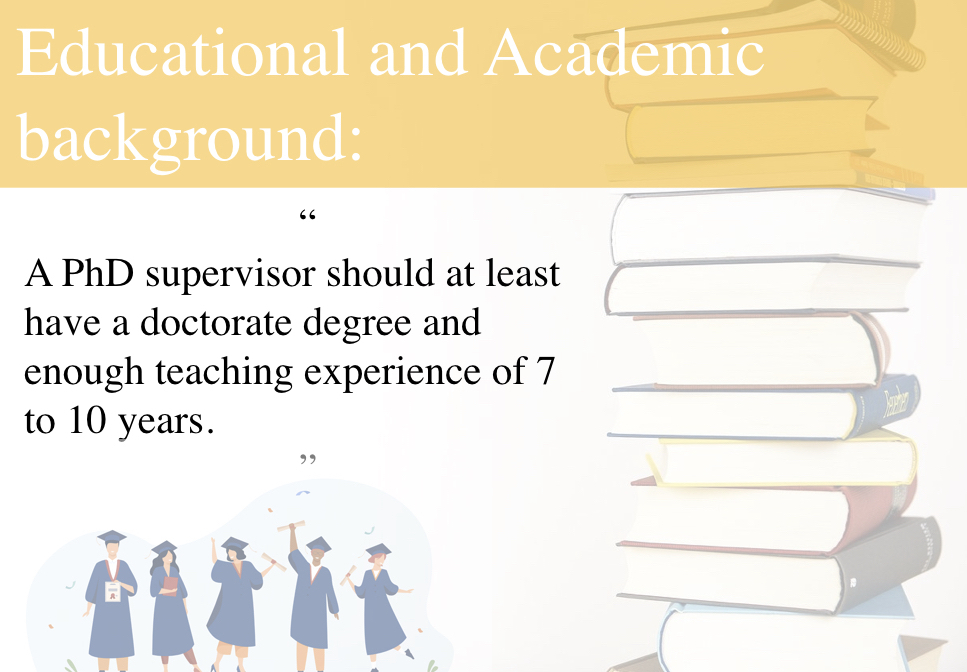
“A student from the University from Gujarat, India told us that at midway he came to know that his guide is incompetent to complete his PhD, because his PhD degree was fake (not earned by the legit way). I am guiding him, externally, during our conversation he told me and said not to reveal his identity.”
God knows other students may have faced the same situation. But the problem is, they indeed didn’t look into his or her supervisor’s qualifications. In other countries like the USA, UK or Canada, where the higher education infrastructure is excellent, students may get all the information of their guide from various research platforms or from the University website.
But in India, where most of the professors are inactive on research platforms like LinkedIn or research gate, getting such information is a hard task. Sometimes, even some deemed universities hide their professor’s details too.
In such cases, students have to suffer. Now, what to do?
Go to various research platforms and check out the educational details of a guide that tentatively gives you an idea about how active he or she is in the research fraternity. If you think that something is missing, be careful and ask them about such information.
If you think that he or she is mostly inactive and/or doesn’t have quality work, please do not make a decision to get into. Check their UG, PG, and PhD degrees and from which university they had pursued their degrees. Checklist,
- Go to their research profile on various platforms.
- Go to the university website and check out the authenticity of the person.
- Check out their higher education and other degrees.
Research background:
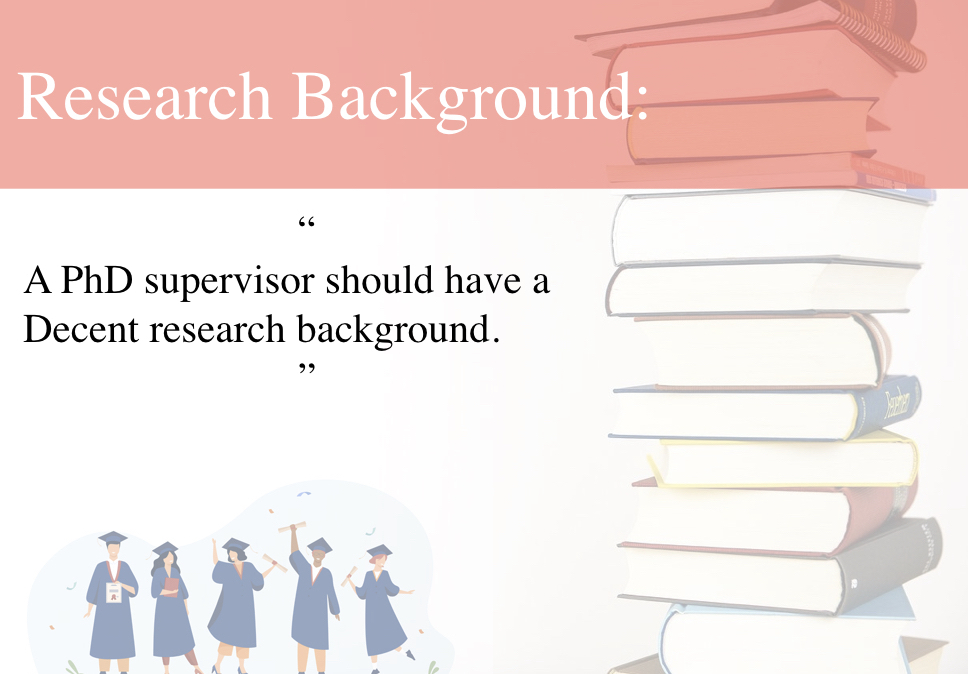
Your collaboration ultimately deals with the research thing, right. So you must have to check the research portfolio of the candidate.
“A student from Hyderabad (I don’t know her university name) contacted me for research help, she was stuck badly. During our conversation, she said that after two and half years of research, she came to know that her guide is not able to complete her research.”
He isn’t able to publish even a single research paper in Scopus-listed journals yet. A big problem. She is in a hurry and wants to publish two research papers in peer-reviewed journals as soon as possible and is seeking our help.
However, ultimately I came to know that her research work isn’t of that level to publish in some very good journals. Still, we are working on it.
The research background of a supervisor, their projects, published work, reviews, patents or any IPRs is a valuable asset for them and for students which ultimately attracts students. Students can see their research portfolio on the Research Gate, LinkedIn and Google scholar.
Further, to get more info. randomly type his or her name in Google and check their popularity, and any substantially different research or outcomes they have. Here is a checklist,
Checkout,
- Their research projects (how many completed, how many are running).
- Publications (reviews, research publications and other forms of peer-reviewed published work).
- Their contribution to other research (collaborations, contribution in a book or chapter, etc).
- Must go through their ResearchGate, LinkedIn and Google scholar profiles.
This much information is enough to understand a supervisor’s research portfolio. But wait, it isn’t yet enough to make a decision.
Meet former students and get their experience:
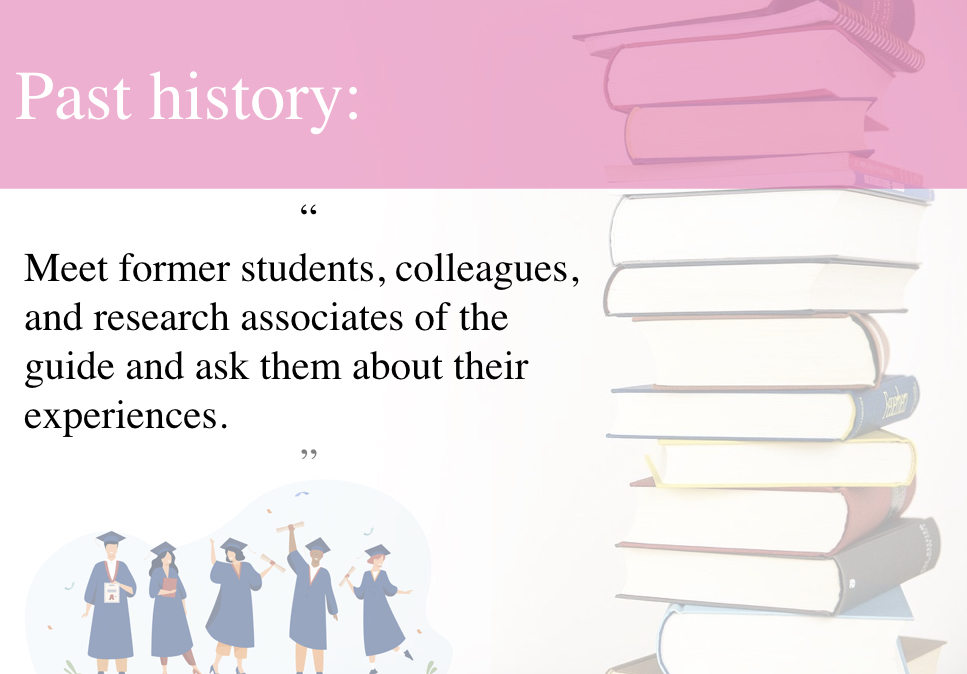
One of my friends; during our collaboration to write an article, told me that his research supervisor is a renowned person and has an excellent research background but his attitude towards students isn’t that good.
He didn’t care about if a student will stay or leave, he treat them like they are servants and also force them to take lectures on his behalf, he said further.
Once you get impressed by the research profile, do not make a decision in hurry, wait and validate some other information.
Meet their (Supervisor’s) collaborations and former students, and understand his or her nature, and how friendly, helpful, emotional, caring and supportive he or she is. If I am specifically talking about scientists in India, they treat themself like they are ‘some’ celebrities and also expect students to treat them like this too. They force students to pay for their stays, travels and other expenses in which students’ research work is involved.
A supervisor would be an international personality, and students should have to admire it but expecting such favors from students isn’t, I think, good behavior. So here is a checklist.
Meet a supervisor’s collaborations, their former students and research colleagues if possible.
- Ask them about their experiences.
- Ask them how supportive, caring, enthusiastic, positive and helpful he or she is.
- Understand how good he or she is in a team and as a team leader.
- Understand how respectful he or she is to other scientists and also to students.
- Most importantly, how students are treated under their supervision.
Qualities- encouraging & challenging:
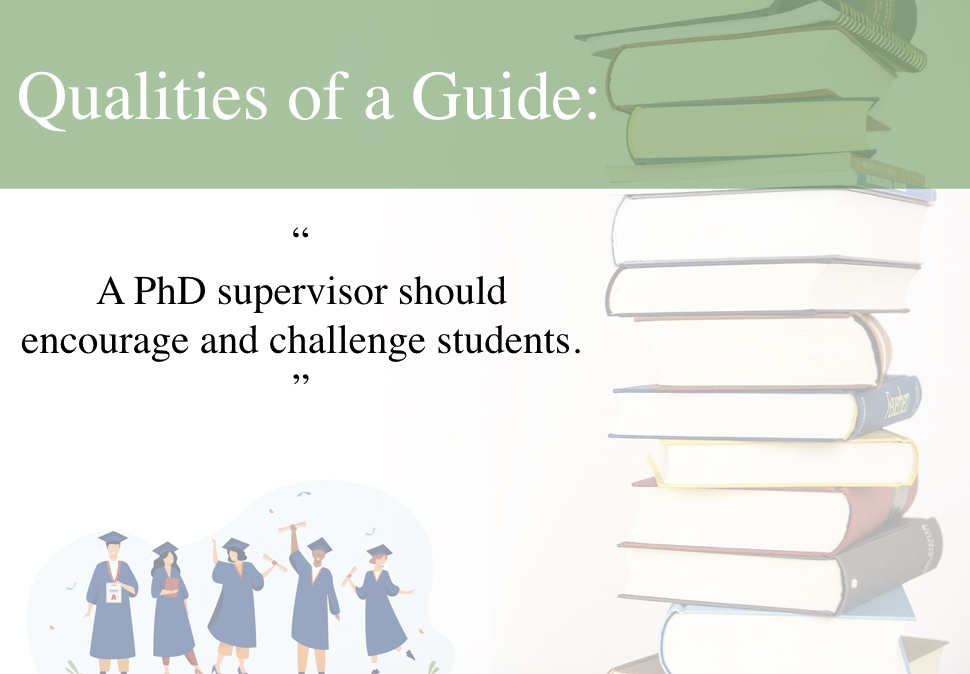
“You should have to understand the difference between harassment & challenge and spoon-feeding & encouragement.”
One of my colleagues, during our talk on a research project, told me, “my guide is so kind, and never scolds me. He even completed my work, checked the thesis and completed mistakes on their own.”
He always said that “my job is to let your research be done and publish your work.” What a great person my guide is!” my friend said further.
Such behavior, on a personal basis, is good but It will not help students in their career endeavors. The ultimate goal of PhD isn’t to get a doctorate label. Supervisors have to understand that the PhD should prepare a student for future challenges.
A guide should be encouraging not spoon-feeding. They encourage students to accept challenges, solve problems on your own, learn new things and complete the job. My guide always told me, “you have to write your own thesis, I will never help you with this. So start learning how to write a thesis effectively from now.”
This, though tortured me a lot initially, but now I can say that I have decent scientific writing skills.
Nonetheless, students have to understand that only these traits of a tutor will help them in their future perspectives. Long story short, a PhD supervisor should encourage you as well as challenge you.
Beyond only the PhD!
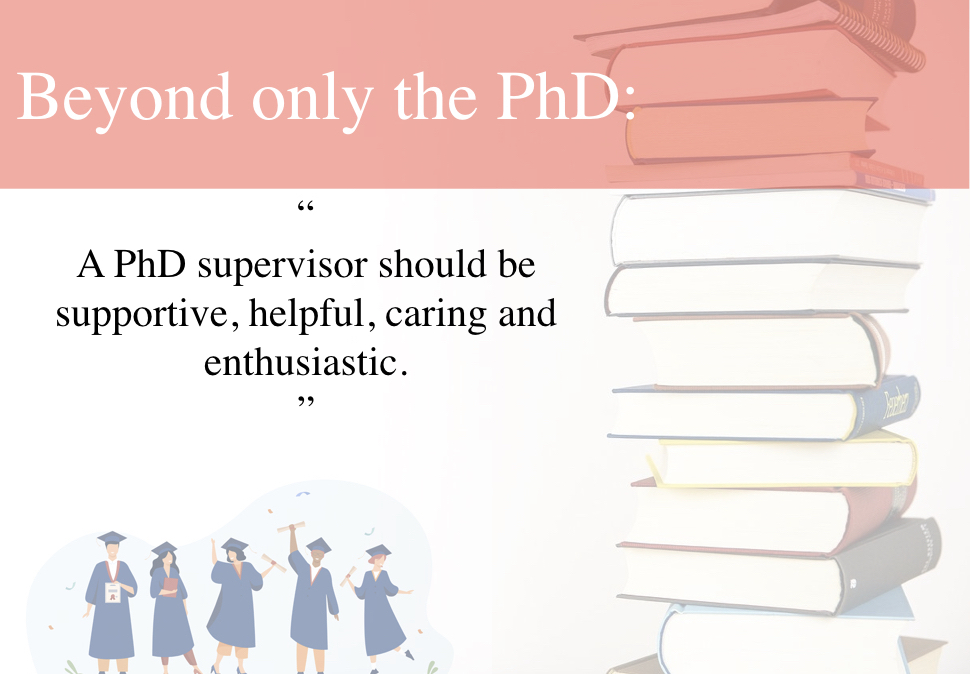
“Sir, can we complete our PhD without even doing lab work? I don’t have the budget but my supervisor doesn’t understand my condition.” One student told me during our telephonic conversation.
“I have a baby but my guide doesn’t understand my condition and forces me to work late at night,” one lady complained in some random PhD group.
Work and budget are two important priorities during the PhD, and I agree with this. But a supervisor has to understand some conditions, although he or she can’t help you out sometimes, nonetheless, some relaxation by a guide will surely give you relief.
We were three research students under Dr. R. K. Patel’s guidance, one of us doesn’t have a budget to completely outsource his work. Our guide found a middle way that one of us three would go to the outsourcing laboratory and would work. We only pay for utilities, not manpower.
Although that didn’t solve his problem completely, at least our supervisor has taken a stand to support him.
A PhD supervisor is a very experienced person in their field, for sure but he or she should have traits to understand students’ conditions too. One study found that 42% PhD students are married and have families.
A guide should have to understand their family values and try to help me.
Checklist. Find Out,
- If the supervisor is supportive.
- Understand students’ problems or not.
- Can solve students’ problems or not.
- Helps students on a personal basis or not.
A skill-developer with integrity:
You don’t know how to even write a synopsis, it’s the easiest and most basic thing in PhD, how will you publish your work? My supervisor shouted at me at our third meeting, Mitesh P said when we met during our PhD.
Integrity is honest with strong moral principles. An ideal doctoral referee should focus on skill development and not only on doing and publishing research. See, publishing research is so important for a PhD but are you able to publish your work from the first year of PhD?
I don’t think so.
A first-year PhD student can’t even prepare their synopsis and PhD project thoroughly, that’s true. These skills build over time, no one has that in-built. And perhaps or indeed a student will be there in PhD to learn such skills.
A doctoral referee with integrity knows that if he or she will focus on skill development, the rest of the things will be done automatically. Although it will take time to develop skills. Checklist,
- A guide will encourage you to learn new skills.
- A guide will motivate you to know new methods and research processes.
- His focus will be on building your strength as a scientist, not theirs.
- His focus will be on not publishing but rather to make you understand how to get published.
How can you know if a guide has integrity or not?
Meet your guide and tell them that you don’t know about academic writing and have not even published good research work. Focus on his or her reaction, you will get your answer.
Meet and interview a supervisor:
Isn’t it possible to take interview of a research guide? No, you can’t!
It will hurt his sentiment if you try to interview them. Then you may wonder how to do this. Let me tell you.
In the very first meeting, tell them your vision, your strengths, weaknesses, family background and problems, one by one and investigate how he (or she) reacts. Take a look at this example,
Students, “Sir, I have an idea (share your research idea) but I don’t know how to start.”
PhD supervisor 1, “Your idea is excellent and we can do it, don’t worry about it, start by writing a synopsis.”
PhD supervisor 2, “ Your idea is good, but as you don’t know how to start, how will you do the rest of the things?”
Student, “Doc, I have never written any synopsis, can you guide me on this?
PhD supervisor 1, “Don’t worry I will tell one of my students, he or she will help you out. Meanwhile, go to Google and search how to write a research synopsis, you will get tons of ideas. Make a rough draft and send it to me.”
PhD supervisor 2, “that’s a problem. Get some outside help and send it to me only if it is perfect.”
I think probably you may get an idea with whom you will go.
Important point: If it is difficult to meet the supervisor from the first meeting, he or she delays the meeting and remains busy with some other stuff, probably things will not go well in the future. We admire their busy schedule but he or she would not give you time during your prospective work.
So in this case, it is better to find some other guide.
His vision:
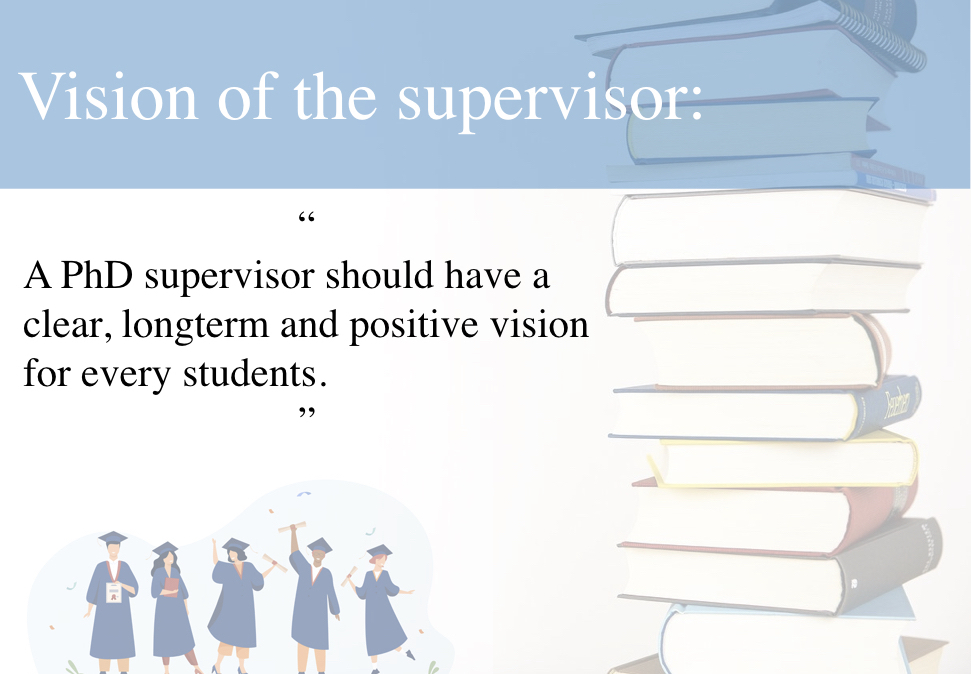
A guide (and a teacher too) should be a visioner, meaning, they should have a vision for something, for their students, for each student. What final product the entire research team wants to achieve.
“Research”- doing something novel, is certainly uncertain! Thus, what final output we’ll get is uncertain too. But an experienced and visionary PhD referee knows what they will get, probably.
This long-term vision prepares students early to face positive or negative results. I am helping students complete their PhD. One of my students is working on Breast cancer and I clearly know what probable results we will get.
We have prepared the draft about what if we get negative results, positive results, no results or abrupt results. Because ultimately her work should not be suffered. That vision a supervisor must always have in their mind for each of their students.
Ask your “supposed to be a guide” their vision, their point of view on results and final outcomes. It’ll eventually give you strength and confidence.
Wrapping up:
I searched many articles and came to know that choosing a PhD supervisor or guide is indeed a problem. Research scholars don’t have any idea about the nature, experience, expertise and behavior of the guide.
They just go through their research background and eventually suffer during their entire tenure, find some external help and support. My goal is not only to complete students’ PhD but also to make sure that their PhD must not be a kind of nightmare for them, they learn something and complete their PhD in a healthy way.
I hope these points will help you in your future PhD endeavors.




